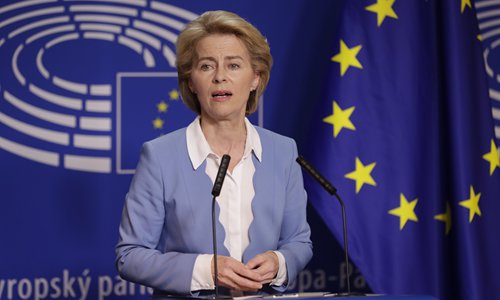HOME >> OPINION
If Von der Leyen heads European Commission, she may have to shed German cloak
By Sun Keqin Source:Global Times Published: 2019/7/11 17:21:40

Photo: IC
German Defense Minister Ursula von der Leyen has been nominated the European Commission president. The nomination reflects Germany's ambition to play a greater role in the EU and to some extent shows Von der Leyen's strong personality and high reputation as a political heavyweight of the Christian Democratic Union of Germany (CDU).
To head the European Commission, the German nominee still has to see her appointment confirmed by a vote of members of the European Parliament on July 16.
There have been certain dissenting voices inside Germany and other European countries. Many from the Social Democratic Party of Germany and the Green Party have questioned the nomination process.
But in spite of such doubts, Von der Leyen has gained the support of major European powers including France and Germany, and has also been backed by many Eastern European countries. In addition, as a member of the European People's Party, she is backed by the largest political group in the European Parliament. Thus it is highly likely that she will emerge victorious on July 16.
Be as it may, if she assumes office, challenges await her.
Generally, the position of the European Commission leader is occupied by politicians from middle and small powers in Europe, while the big countries stay out of the competition. But if Von der Leyen from Germany, the most powerful among the 28 EU members, gets the spot, other powers, especially the middle and small ones, will certainly feel uneasy. Furthermore, due to her tough image and policy, such uneasiness might be heightened.
Hence, to lead the European Commission, Von der Leyen should work at burnishing her image to appear to be more of a European politician than merely a German one. She needs to keep the continent's overall interests in mind and coordinate relations among big and small powers as well as Eastern and Western Europe. If she fails to change and still considers German interests as European interests, there will be mounting resistance.
Thus, if Von der Leyen takes office, Germany's influence may get a fillip but other countries will start to push back at Berlin.
Germany and France are two most important engines of the European integration. The CDU and Von der Leyen herself are also supporters of a united bloc. If integration hits a roadblock, the German politician as the possible future leader will undoubtedly help advance the European integration process. Thus, the interests of Germany will be more closely linked to the whole continent.
Nonetheless, anti-integration views, including populism, have gained ground in Europe. She needs to balance such forces and manage various conflicts. It might not work if she pushes the integration too fast.
A significant shift is unlikely in the EU's foreign relations. First, though the German politician has previously sounded alarm bells about China's impact on Europe, Beijing's ties with the continent may not be affected. As Germany is a core member of NATO, it is not surprising that Von der Leyen, as the German defense minister, has taken the same political position with NATO, and thus made certain ideological remarks.
Not only she, many inside Europe have increased doubts about China. But Von der Leyen is a pragmatic politician. She is expected to re-examine China-EU and China-Germany relations, and finally redeem herself.
Moreover, the European Commission chief cannot play a decisive role in dealing with China-EU ties. Her approach toward China will be tempered by Brussels and other countries' policies.
Second, there are strains between the EU and the US. In particular, Washington has been taking aim at Berlin, mainly over military issues. The German defense minister has been in favor of strengthening NATO and increasing military spending, but she has been concerned about US hegemony and the White House's bellicose attitude.
Therefore, in terms of US policy, she may be cooperative, but will certainly not let the EU be bullied. She once clearly opposed US pressure on Germany to boost its military spending.
As the future European Commission head, Von der Leyen is expected to stand by European interests and positions if the US piles up pressure on Europe. But she will also try to reconcile differences and improve relations with the US.
The author is a research fellow at the China Institutes of Contemporary International Relations. opinion@globaltimes.com.cn
Posted in: VIEWPOINT